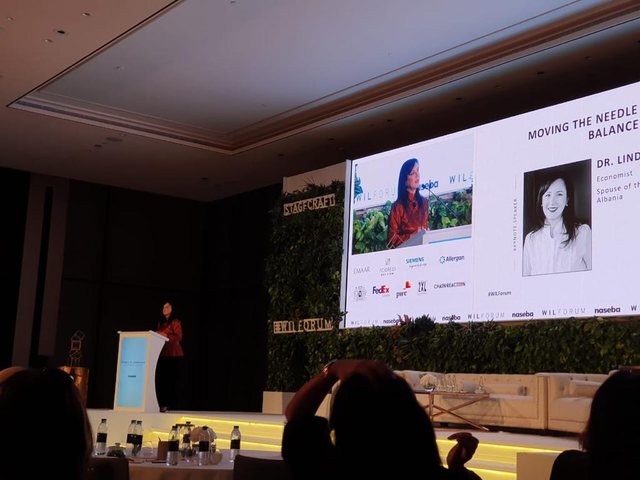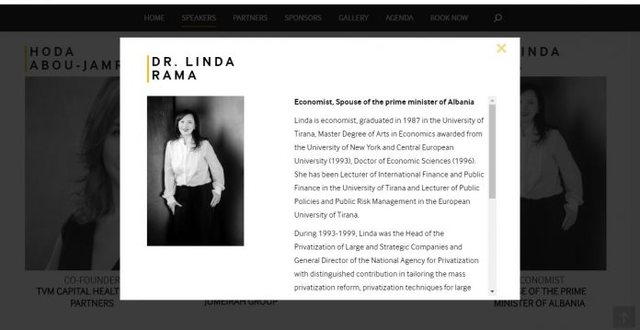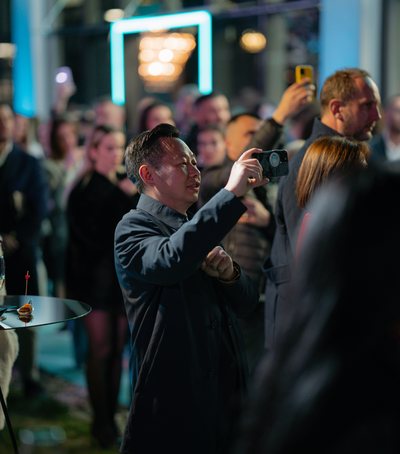
I come from one of the youngest middle-aged countries in Europe. When I was young, let's say younger, my place was "the North Korea of Europe". Isolated like no other country in Europe until the end of the Cold War, Albania, neighboring Italy, Greece, and the former Yugoslavia, went through two long traumatic periods: the period of five centuries of Ottoman occupation, until the beginning of the 20th century, right after World War II, the half-century period of the most egregious communist regime on our continent.
I am grateful to NASEBA for inviting me to be present at this meeting and feel privileged to be given the opportunity to speak before you, as the representative of a place where history has shown its most brutal side and the brutality of the time we live in, has made it particularly difficult to bridge the history gap between us and Europe, to which we belong geographically, culturally and spiritually.
Albania is a predominantly Muslim country, where Christians celebrate Eid al-Adha and Muslims celebrate Christmas just as naturally.
I come from a Muslim family, my husband is Catholic, our two children from a previous marriage are Orthodox Christians, and the third, our five-year-old son, will choose for himself what religion he will belong to if he wants to. someday this election of course.
Albania is the homeland of Mother Teresa, the small-hearted woman with great courage and passion, who embodied worldly the symbol of love and selflessness for the weakest and became, thanks to her sublime devotion, St. Teresa of Calcutta.
Albania is the place where at the end of World War II, there were more Jews than at its beginning, and where, thanks to the courage and loyalty of the Albanians, the Jews found protection and not a single surrendered to the Nazis.
Albania is the place where in our first Constitution, the Canon of Albanians, since the Middle Ages, was written in the first sentence and remained written in our collective consciousness as a non-negotiable value of our community: The Albanian House belongs to God and Friend.
With the greatest pleasure, I would like to express before you the desire and invitation at the same time to choose Albania in the future as the place to organize your conference. I assure you that you will not regret it!
On the day I came out of the darkness of communist isolation, I was only 26 years old. I had just started working as an economist in a typical communist enterprise, when I suddenly found myself, like all Albanians, in the midst of an open sea of dizzying changes and the opportunity to have more than just a choice for the future.
On that day, we had only the freedom to look at the world that appeared magical and tempting before us, but nothing of that world of infinite freedom and universal rights. On that day, the Constitution of Albania still stated that taking foreign loans was a national betrayal and any private economic activity was forbidden just like any criminal activity. There was only one bank that credited the state economy; only one employer, that was the state; only a television and radio station, where only the state could be seen and heard; there was only one party, the Party - State of Labor of Albania.
On that day we were all equal, in the same houses that were the state, with the same economy, which was the family economy of survival, and above all, equally ignorant of the ways of navigation on the high seas, where each he had to choose a destination of his own, both desirable and unknown.
Many opted for emigration, embarking on a long journey of sacrifice to integrate into new environments where other languages were spoken, new rules respected and, as a rule, prejudice and discrimination against migrants arriving by boat the rusting of communism on the shores of the new world was the rule not the exception.
Another chose the equally difficult path of integration into the new system internally, where the old rules fell overnight and the new rules took years to write and even more, to get through. was implemented.
I chose to study at a university abroad, with the fixed idea of returning more knowledgeable to my home country. And so I did.
Today, when I have to talk about the challenges of the youngest, I find it easy to remember where we came from, we young people only 30 years ago, but I find it difficult to visualize because of the dizzying changes in the fraction of time we live in, where those who have not yet reached the thirties can arrive. And the more I feel for my children the uncertainty that globalization and the new sea of digital communications, interactions and influences bring with them, the stronger my conviction that the only compass for young people and for families themselves, it is the fanatic education of the principles and values of a civilization that is increasingly threatened by the loss of the compass.

Sorry for this bracket, but I sincerely want to share with you my powerlessness, as a woman, as a mother, as an intellectual if you will, to feel confident in the power of words that can be said for young leaders as a function of a better future, in the face of the rapidity of the great and frightening force relativizing the consolidated principles and values of our civilization that this new world brings to the youngest; killing time to doubt, to verify, to weigh opinion and to argue or prove otherwise.
However, Albania today is a completely different reality. Albanian immigrants landed on the shores of the New World by rusty boats in the early '90s have succeeded in having children born in the offshore storm of that time, today fully integrated into the realities of other countries, as the "radiation" of our nation in these places, as Kadare our eminent writer calls them. I am convinced that many of you have had the opportunity to know this Albanian radiation in universities, communities, enterprises, international institutions, in the arts and culture scene and environments, and even in politics where lately there are more and more Albanians competing for representation mandates, from local councils, to parliaments to the US Senate.
The same spectacular effort and investment has been made by Albanian families to educate their daughters and sons, whether in Albania or abroad, creating an army of young people with tremendous potential not only to increase their energies in facing today's challenges, but also to ensure the sustainability of development for years to come.
The mosaic of opportunities for women and young people to contribute is very diverse and it is impossible to address this, but I want to focus on the two most important, decision-making empowerment and economic empowerment.
In recent years in Albania, a significant number of important public platforms, from those in politics to those in administration, have been occupied by young people and special attention has been devoted to ensuring gender balance in representation.
30% of parliamentarians are women today, 8 of the 15 cabinet members are also women, ranking Albania fifth among the 22 countries with the most gender-balanced cabinets in the world. These Ladies currently run sectors that had never been entrusted to women.
Energy and infrastructure today have a woman minister, as well as finance and economics. The ministers of Defense, Justice, Education, Health, Culture and Relations with Parliament are also women. Most of them were under 39 when they took office. Diplomacy and foreign relations have been entrusted to a young man who is only 29 years old.
47% of deputy ministers in my country today are women. 40% of central institutions and 45% of Directorates-General are headed by women. 25% to 41% of those holding senior public office are under the age of 39.
All of this set of youth and women working today at these levels is not only the fruit of a long-term individual, family and social investment amid innumerable sacrifices deeply rooted in history, but also an expression of an inner willingness to publicly demonstrate to girls and boys who have the passion to get involved in politics and public administration, that this is possible.
However, although at the forefront of empowering the decision-making role of women and youth, in prominent proportions in recent years, women and youth who own and own public platforms have not yet conveyed such sensitivity to issues. youth and gender, which would make this process a force of change spread across all strata of society. We have not yet seen this empathy, translated into action, get the attention it deserves along with the agenda of the day, though society has a comparable need for it to the blind for light.
If today, those who hold these positions do not care and create clear prospects for all those young men and women who struggle daily with the inability to pursue their passions and dreams, the innumerable obstacles to the tangled threads of bureaucracy. , poverty, talent deprivation, inability to exhibit values, or all those women who suffer aggression, verbal violence, gender discrimination, sexual harassment in the workplace, and many phenomena especially in poor and suburban areas, then not they will only remain in indelible debt with society, but will produce a burden that costs society much.
Inclusion of women and youth in the economy is very important today. One third of the employed in the economy today are young people aged 15 - 28 years. 30% of administrators and private business owners are women. And more than 40% of frontline management positions in private companies are women. However, the higher in the decision-making hierarchy of companies, the fewer women result. There are even sectors where although the main mass of employees are women, such as banks, non-bank financial institutions or insurance, at best there are one or two women board members, but in most cases they have no woman on board. And there is no governing board that does not have at least one male member, as if the governing boards of these institutions could function very well without a woman, but they could not exist without a man. Advancing youth career in the private sector and unfolding their full capacity becomes difficult due to the nature and size of the business, which is dominated by small and medium-sized businesses. But I am convinced that hundreds of thousands of well-educated and highly talented young Albanians, at home and abroad, today have a tremendous potential to contribute if large foreign companies decide to invest in Albania. The presence of large international companies, in countries such as Albania, would be extremely beneficial not only to the economy, but most notably to modernizing the business environment and imposing the best standards on it.
Without wanting to take more time and being aware of the complexities of the time we live in, which threatens equally, albeit in diverse forms, levels, and content, both young men and women, in both developed and developed countries even in developing countries, such as Albania, allow me to conclude with one of the few certainties I have. The more the new world emerging with the fury of a speed that was unimaginable until a few years ago, will provide us with new instruments of communication and interaction, the more alarming is the need to defend the old world of values and principles. sin under the roof of the family, articulated within the walls of the school, imposed on the path of coexistence of our communities, as inevitable codes of communication and interaction between us. These values will be the best weapon in the hands of every young man, girl or boy, not only in the way of career advancement, but especially in their attention and contribution to the benefit of a better society in the future.
The more the barricades of non-communication, or the glove-free confrontation between those who think alike against those who think differently, in the territories of the virtual world, and the more the truth confronts the epidemic of lies, the more alarming it becomes the need to protect our children from the epidemic in question, which is not at all difficult to ascertain as having affected the highest decision-making spheres, even in the most developed and richest countries in the world.
Of course, my findings are nothing new to anyone who has a modest attention to this situation as impregnated with great potential for the benefit of mankind as well as full of great threats to our civilization. But hoping that in any case, my contribution to this notebook has been valuable to you, that you have had the pleasure of listening to me, thank you very much!
* Speech delivered at the "Women in Leadership Forum - Naseba", held in Dubai, United Arab Emirates





